Hypothyroidism: Causes and Consequences
Hypothyroidism is the second most common disease among women. 60% of the population walking around with an undiagnosed problem. A simple blood test could reveal the condition of your thyroid gland. The Thyroid gland is a very important gland for our good health and wellbeing however, because of faulty lifestyle and stress, the function of the thyroid can go off. This blog is all about hypothyroidism, its causes, symptoms, and how you can treat this imbalance through a holistic approach.
What is Hypothyroid?
In simple words, Hypothyroid is an underactive thyroid condition that means when your thyroid gland doesn’t secrete an adequate amount of thyroid hormone to full fill your body requirements.
The thyroid is a Tiny butterfly-shaped gland that exists at the front of your neck. it secrets hormones that control the body’s most important functions such as heart rate, digestion, breathing pattern, weight etc. If the thyroid gland goes off balance, it directly affects the body’s natural functions.
Does Hypothyroidism a Common Problem?
Hypothyroidism is the most common problem that one can encounter in their lifetime.
Though this condition can develop at any age, from a newborn to an elderly person, however, middle-aged women are more likely to have hypothyroid. 1 in every 8 women will develop an underactive thyroid condition at any point in her life.
But it doesn’t mean that men are exceptional to an underactive thyroid condition. Hypothyroidism can develop in men as well.
What Causes Hypothyroidism?
An underactive thyroid can develop due to many reasons. Some include:
- Hashimoto’s disease, an autoimmune condition where the immune system fights back to your thyroid. Hashimoto’s is the most common cause of the hypothyroid condition.
- Certain kinds of medications
- Radiation therapy
- Surgical removal of a part or full thyroid gland
- Thyroiditis: swelling or inflammation of thyroid gland
- Hyperthyroidism treatment
- Pregnancy
- Leaky Gut
- Pituitary Disorder
- Congenital Hypothyroidism: when the thyroid gland is not functioning properly since birth
- Iodine deficiency
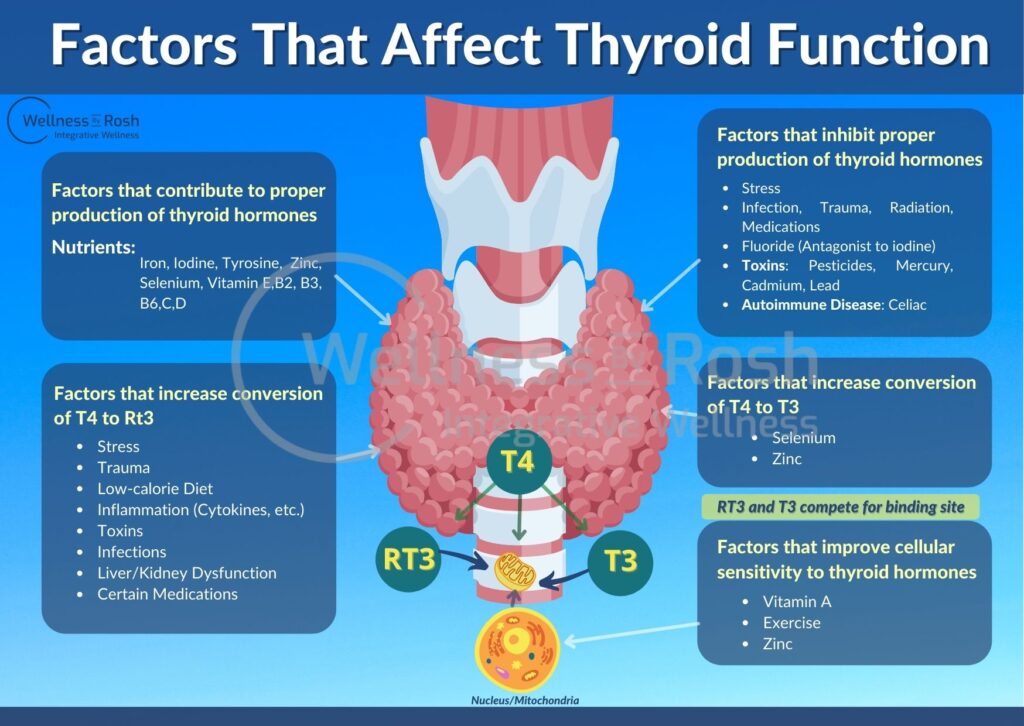
What Are The Symptoms Of Hypothyroidism?
If a person develops hypothyroidism, it may show various signs and symptoms. Some includes:
- Fatigue
- Constipation
- A puffy face
- Dry skin
- Low libido
- Depression
- Goiter
- Slow heart rate
- Brittle nails
- High cholesterol
- Fluid retention
- Poor memory
- Headache
- Muscle aches
- Poor concentration
- Alopecia
- Edema in legs
- Skin Disease
- Tingling sensation in hands
- Weight Gain
- Migraine
- Cold hand and feet
- Low body temperature
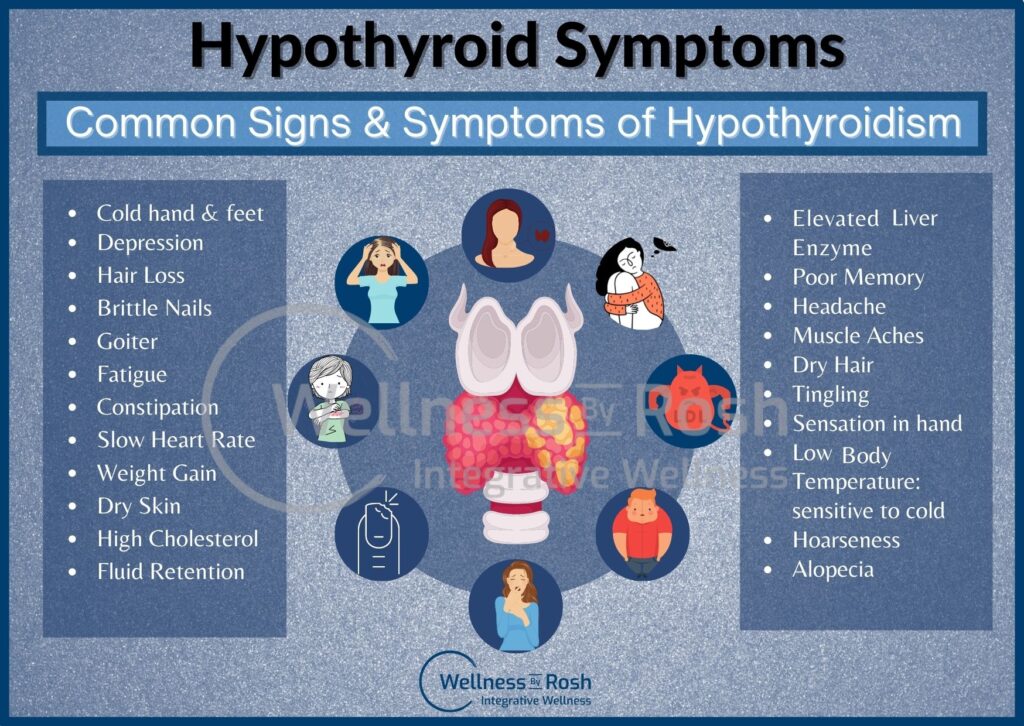
Who Is More Likely To Have Hypothyroidism?
A person at higher risk for hypothyroidism, if
- The person is female
- is older than 60 years of age
- Had thyroid problem earlier, such as goitre
- Had undergone surgery to treat a thyroid condition
- Have type-1 diabetes
- Have rheumatoid arthritis (RA)
- Have lupus (chronic autoimmune disease)
- Recently delivery a baby
- Having a family history of thyroid condition
- Received any kind of radiation treatment for the thyroid problem
What Are The Complications Of Hypothyroidism?
Untreated hypothyroidism may cause:
- An underactive thyroid can lead to high cholesterol
- Affects mental health
- Goiter
- Infertility
- Birth defects
- Myxedema
- Peripheral neuropathy
- Pregnancy complications
- Obesity
- Metabolic syndrome
- Rheumatoid arthritis
How Is Hypothyroidism Diagnosed?
If you have the above-mentioned symptoms of hypothyroidism, Your health care provider may suggest to you some tests to perform to make a diagnosis.
- Self-test of measuring body temperature underarm (15 minutes) or under the tongue (3 minutes) with an oral thermometer, immediately after waking up on the bed. If it’s < 97.6 F then it indicates an underactive thyroid.
- A physical checkup
- A medical history
- Thyroid blood tests, such as
- TSH (Thyroid-stimulating hormone)
- Total T4 (Thyroxine), Total T3 (Triiodothyronine), Free T3, Free T4, Reverse T3
- Thyroid antibodies (Anti-Tg, Anti-TPO)
What Is The Optimal Range OF Thyroid?
You can find out if your thyroid is functioning properly or not by checking your TSH levels. Though the TSH level varies by gender, age, and medical history, however, in general, TSH optimal ranges are:
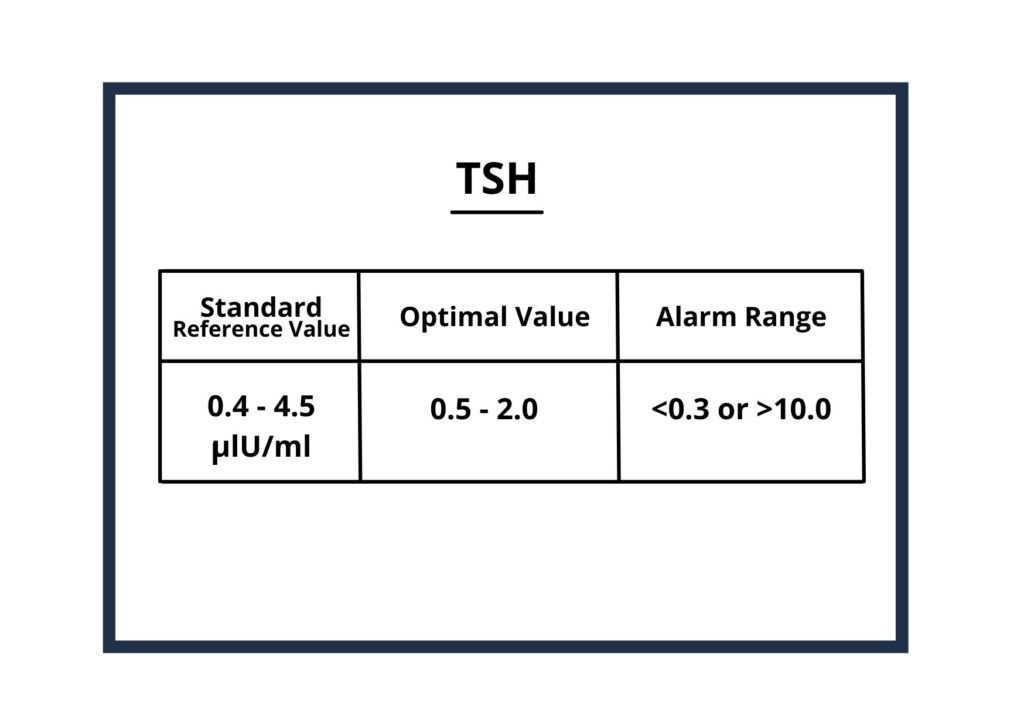
Supplement Suggestions For Hypothyroid And Hashimoto’s
Research shows that some supplements can be beneficial for Hypothyroidism and Hashimoto’s disease:
- Selenium helps in decreasing thyroid antibodies and boost mental health.
- Iron deficiency may also cause hypothyroidism it may lead to anemia, a good iron supplement may help to restore iron in the body.
- Vitamin D deficiency is very common in people, suffering from hypothyroidism. taking a supplement may help to restore vitamin D to optimal levels.
- Vitamin B12 or B complex supplements may also help to maintain the optimal level in the body.
- Magnesium deficiency increases the risk of getting Hashimoto’s disease and taking Mg supplement will help to lower the symptoms.
- Zinc is a crucial nutrient for thyroid health as it is needed for thyroxine hormone production. Taking zinc supplements may increase thyroid function.
- Tyrosine supplements may also help to increase the thyroid hormone.
- Iodine supplements are very helpful for Hypothyroidism, but to be avoided for high thyroid antibodies cases.
- Some herbal supplements such as Ashwagandha and Guggul are also beneficial for thyroid health.
Kindly consult with your medical practitioners for any change in diet and for intake of any supplements.
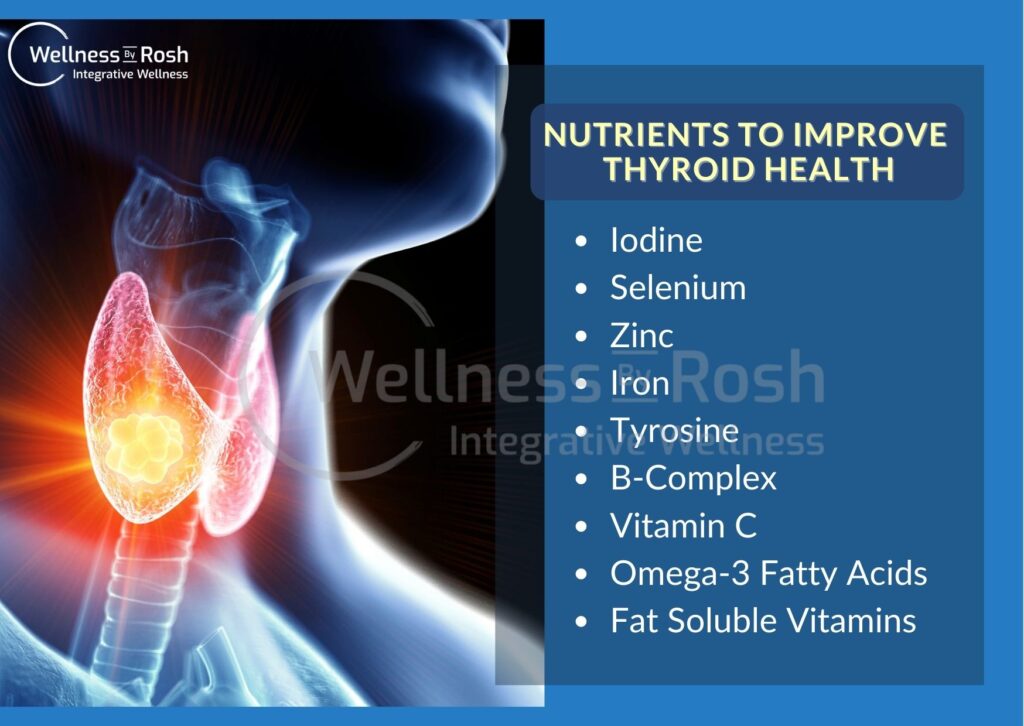
Can Hypothyroidism Manage By Lifestyle Changes?
A thyroid disorder generally develops as a result of poor eating habits, stress, an inactive lifestyle, and some other factors. However, an underactive thyroid can be managed successfully through lifestyle changes. some include:
- Limit the sugar intake
- Eat a healthy and balanced diet
- Do some kind of physical activities every day
- Get quality sleep for at least 7 hours
- Maintain a healthy weight as it affects the hormones
- Manage your stress level
- Practice some pranayama such as Ujjayi, Nadi shodhana, etc. and meditation on a regular basis
- Some yoga asana also helps such as, Surya-Namaskara, Sarwangasana, Halasana, and Pawanmuktasana et.
- Your body talk, learn to understand the body language
- Mindfully start supplements, be careful while starting any kind of supplement
- Avoid packaged and sugary food as much as possible
- Add an adequate amount of iodine to your diet
- Focus on vitamins and minerals, such as vitamin-B complex, and Selenium etc.
- Try to have a gluten-free diet
Conclusion
Hypothyroidism is a very common health condition, especially in women, timely diagnosis will help to reverse the disease, however, untreated prolong hypothyroidism may cause several health complications.
The symptoms of an underactive thyroid, often mistaken with the weather change condition. See your physician if you are feeling exhausted for no reason and developing other symptoms like unexplained weight gain, puffy face, constipation or horse voice.
Fortunately, this is a simply treatable condition. Simple treatment and integrative approach of holistic lifestyle and nutrition could improve your quality of life.

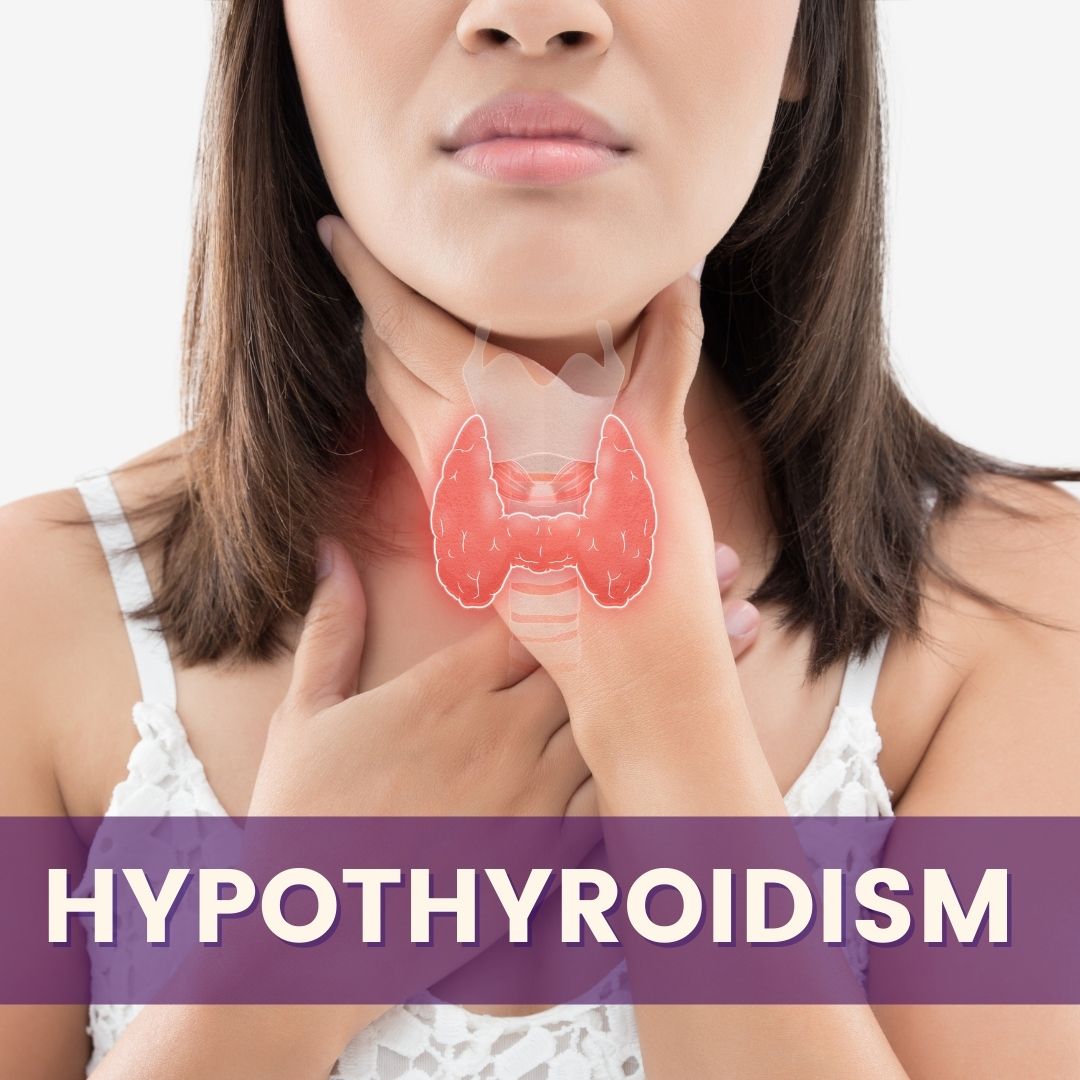





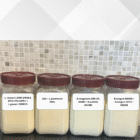



Celiac Disease: Chronic Digestive Disorder - Wellness By Rosh | Integrative Wellness
1-Feb-22[…] Thyroid Disorder […]
Dr Alok Chopra
28-Jun-22Very good read
Wellness By Rosh
28-Jun-22Highly appreciate your feedback Dr. Alok